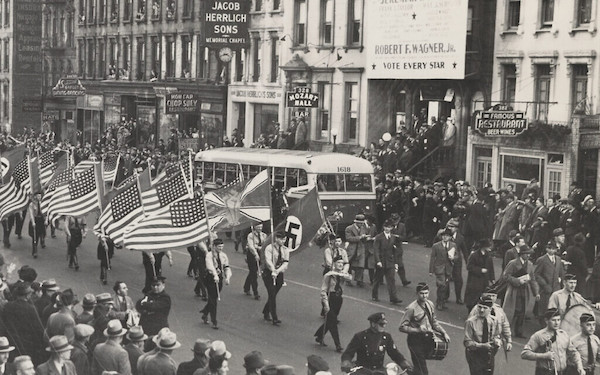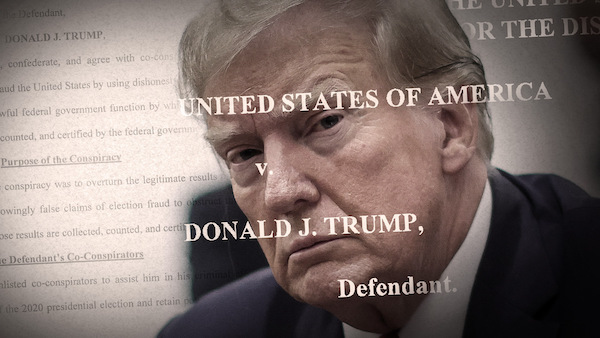Doc Talk: Racism and the Race to the White House
By Peter Keough
Two PBS documentaries paint a grim picture of the American soul.
Nazi Town, USA on American Experience on PBS, PBS.org & PBS App.
Democracy on Trial, premieres January 30 on Frontline on PBS, PBS.org & PBS App.

The pro-Nazi German American Bund holds a parade on East 86th Street in New York City on October 30, 1937. (Library of Congress)
A pair of documentaries on the past, present, and future of fascism in America make for timely viewing as the Presidential primary season begins.
The title of Peter Yost’s Nazi Town, USA refers to the planned community of German Gardens in Yaphank on Long Island established in the 1930s by the German American Bund. It had been designed for patriotic Americans who felt that Nazi ideology fit well with their notion of an all-white, all-Aryan nation.
Founded by Fritz Kuhn, a naturalized citizen who had fled Germany for the US after participating in Hitler’s failed Putsch in 1923, the Bund also hosted summer camps. The film opens with archival clips of one of those popular resorts where kids cavorted doing healthy outdoor sports, more like the ranks of strapping athletes in Leni Riefenstahl’s Olympia (1938) than the motley slobs at a typical Trump rally.
The Bund’s popularity peaked with a rally at Madison Square Garden in February 1939. Festooned with a fusion of Nazi and Yankee Doodle iconography and attended by 20,000 “Sig heil!”-ing Hitlerites, the event was also reported on by the ballsy, jeering anti-Nazi journalist Dorothy Thompson (she was escorted unharmed from the arena unlike a young Jewish protestor who got the crap beaten out of him). This nightmarish circus can be more fully appreciated in Marshall Curry’s Oscar-nominated short A Night at the Garden (2017).
With Christian demagogues like Father Coughlin filling the airwaves with anti-Semitic bile, industrialists like Henry Ford publishing the libelous, conspiracy theory diatribe The International Jew, and heroes like Charles Lindbergh preaching America First isolationism with an approving nod at the burgeoning fascism in Europe, the ’30s sound a lot like the poisonous cultural swamp we live in today — an obvious point that Yost refrains from making. However, when Kuhn was imprisoned after being convicted of embezzling Bund funds to pay for his mistresses, and as isolationism became moot following the attack on Pearl Harbor and the subsequent German declaration of war on the US, this Nazi flirtation faded like a bad dream. Or so it seemed.
A key point Yost makes is that seeming aberrations like Long Island’s Nazi Town spring from a xenophobic component embedded in the American spirit: it might at times go into remission but it never fully disappears. Tracing this racist, anti-democratic tendency back to the rise of the Ku Klux Klan after the Civil War and the flourishing of the Jim Crow segregation laws in the late 19th and early 20th century, Yost underscores the persistence of this cancer to the present day.

The “signature image” for Michael Kirk’s frightening 2-1/2 hour documentary Democracy on Trial. Photo: PBS
It can be seen in the Confederate flags brandished by the thousands of Donald Trump supporters during the assault on the Capitol on January 6, 2021. A spectacle that still shocks, it opens Democracy on Trial, Michael Kirk’s comprehensive and terrifying 2-1/2 hour documentary about the House select committee’s investigation into the attack and the subsequent Federal indictments of Trump’s involvement in it.
These flags made an especially distressing impression on Mississippi Congressman Bennie Thompson, who chaired the committee. It reminded him of those flaunted by white supremacists during the dying days of Jim Crow and the rise of the Civil Rights movement. Back then they were trying to deprive people of their right to vote and here they were again with their banners unfurled in another assault on this fundamental right as they tried to stop Congress from ratifying the results of the 2020 election. Thompson and the rest of the committee realized that no less than the survival of democracy was at stake in their investigation.
The film follows the brilliantly orchestrated outlining of their case (they enlisted former ABC news president James Goldston as a producer), which soared in the ratings as it unfolded on prime time TV and deftly parallels it with the indictments drawn up against Trump by the Department of Justice. The result is filled with many wrenchingly dramatic moments, not the least of which are images of hordes of rioters battling the outnumbered Capitol police as the Vice President is hustled away by Secret Service moments before the mob chanting “Hang Mike Pence!” could reach him. There are also many unlikely heroes, such as the mother and daughter who worked the polls in Georgia and whose lives were ruined when then President Trump identified them as perpetrators of voter fraud. Or the Arizona Republican and fervent Trump supporter who refused to kowtow to the President when he demanded that he not certify that state’s election results.
But the film cautions that, as powerful as the committee’s efforts were in incriminating the President, the dynamics of an actual trial — if it ever takes place, which is unlikely if Trump wins the 2024 election — will be murkier and full of uncertainties. Especially since the heroism of those who defied intimidation to speak out against Trump at the hearings is not widely shared these days. Republicans who denounced him after the infamy of January 6 have since cravenly recanted and sought his favor; almost all those who have opposed him in his run for the 2024 nomination have since become his sycophants.
And then there are his followers. As the documentary points out, no criminal conviction, no revelation of depravity will deter the fanatical adoration of this cult. Trump notoriously bragged that he could shoot someone on Fifth Avenue and people would still vote for him.
He was only partly right: They love him not despite the criminality, but because of it.
Peter Keough writes about film and other topics and has contributed to numerous publications. He had been the film editor of the Boston Phoenix from 1989 to its demise in 2013 and has edited three books on film, most recently For Kids of All Ages: The National Society of Film Critics on Children’s Movies (Rowman & Littlefield, 2019).
Tagged: Democracy on Trial, documentary, Michael Kirk, Nazi Town, Nazi Town USA, PBS
